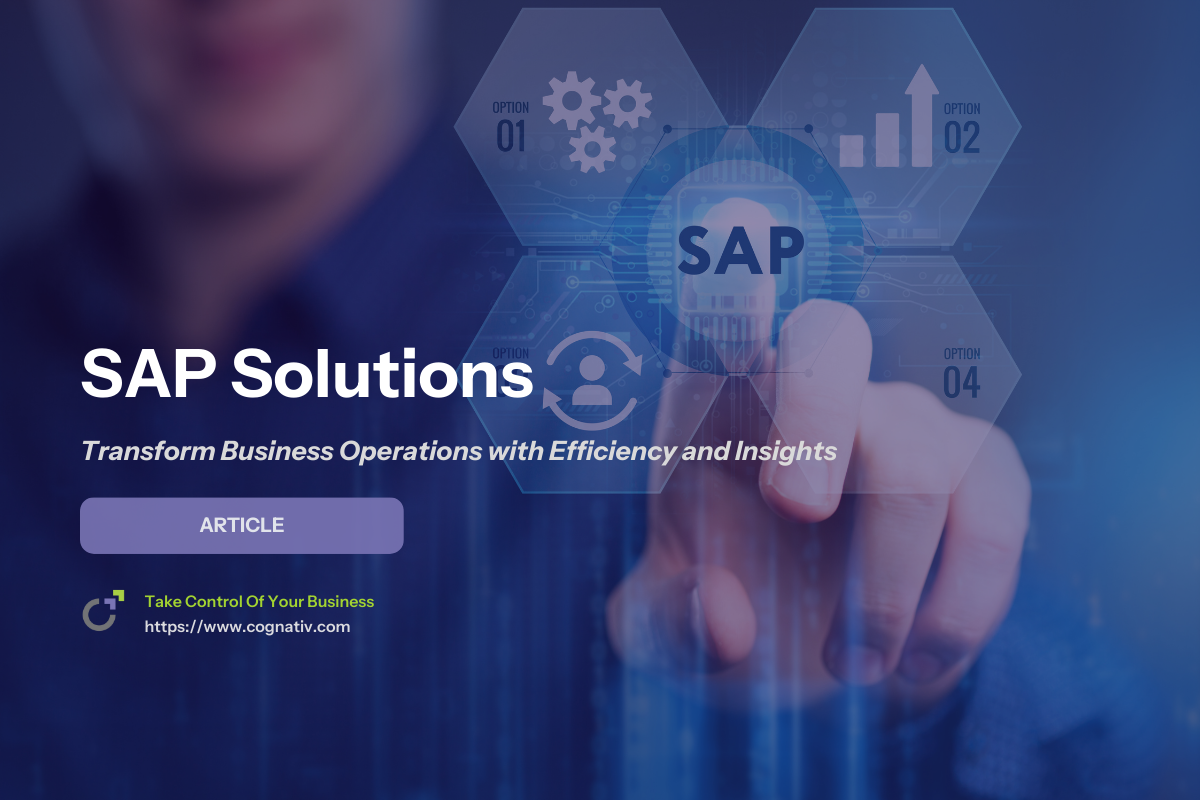SAP Solutions: Business Operations with Efficiency and Insights
SAP solutions help businesses improve efficiency and gain real-time insights across all operations. Whether it’s managing your finances, optimizing your supply chain, or enhancing customer relationships, SAP covers it all. In this article, we’ll explore key SAP solutions and the benefits they bring to your business.
Key Takeaways
-
SAP solutions, including ERP, HANA, and S/4HANA, enhance operational efficiency by integrating core business functions, providing real-time insights, and enabling data-driven decision-making.
-
SAP’s comprehensive customer relationship management tools streamline interactions and automations, improving customer engagement and satisfaction across various touchpoints.
-
The SAP Business Technology Platform supports digital transformation through scalable services, integrating data management, analytics, and application development for tailored business solutions.
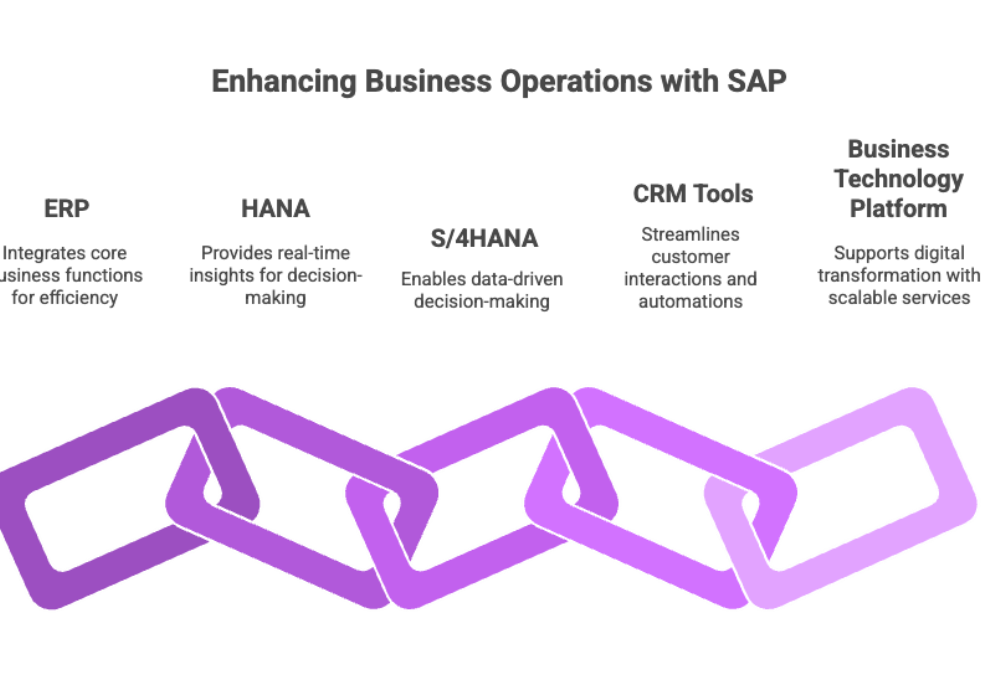

SAP ERP: The Backbone of Business Operations
At the heart of modern business operations lies an erp system, a unified platform designed to manage critical business processes such as finance, human resources, manufacturing, and supply chain. Consolidating these functions, SAP ERP enhances cross-departmental collaboration, creating a shared data environment that promotes seamless communication and efficiency within the SAP Business Suite.
One of the standout features of SAP ERP is its ability to streamline operations. Integrating various organizational units, SAP ERP reduces manual tasks, thereby boosting productivity and minimizing errors. The comprehensive view provided by consolidated data supports data-driven decision-making, allowing businesses to navigate complex challenges with confidence.
The impact of SAP ERP on business efficiency cannot be overstated. With its powerful data processing capabilities, companies can gain real-time insights into their core business processes, enabling more informed and strategic decisions. Implementing SAP solutions allows businesses to transform their operations, driving both short-term gains and long-term growth.
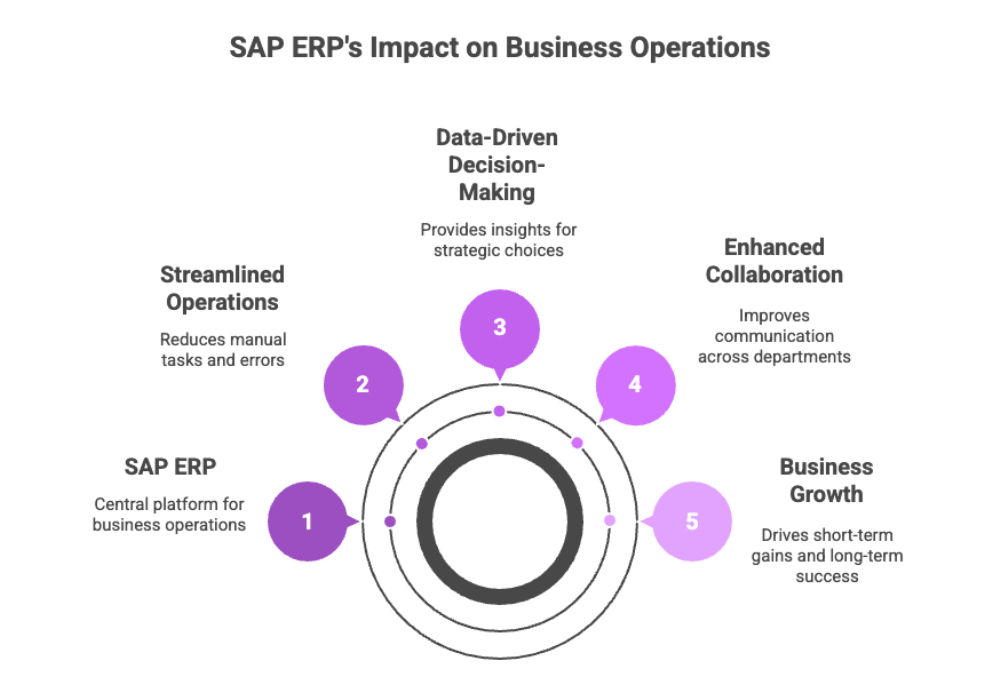

SAP HANA: Revolutionizing Data Management
SAP HANA stands at the forefront of data management innovation, utilizing in-memory computing to deliver unparalleled speed and efficiency. Unlike traditional disk-based systems, SAP HANA stores data in RAM, significantly reducing access delays and enabling faster data processing. This architecture is a game-changer for businesses, allowing them to process large volumes of data in real-time and derive actionable insights without the need for batch processing or data pre-aggregation.
Beyond its speed, SAP HANA serves as both a database and an application development platform, facilitating the integration of data from various sources, including ERP and IoT. This comprehensive approach supports complex analytics and real-time decision-making, providing businesses with the agility they need to thrive in a rapidly changing market.
Moreover, SAP HANA’s scalability ensures that it can meet growing data needs, supporting future growth and innovation.
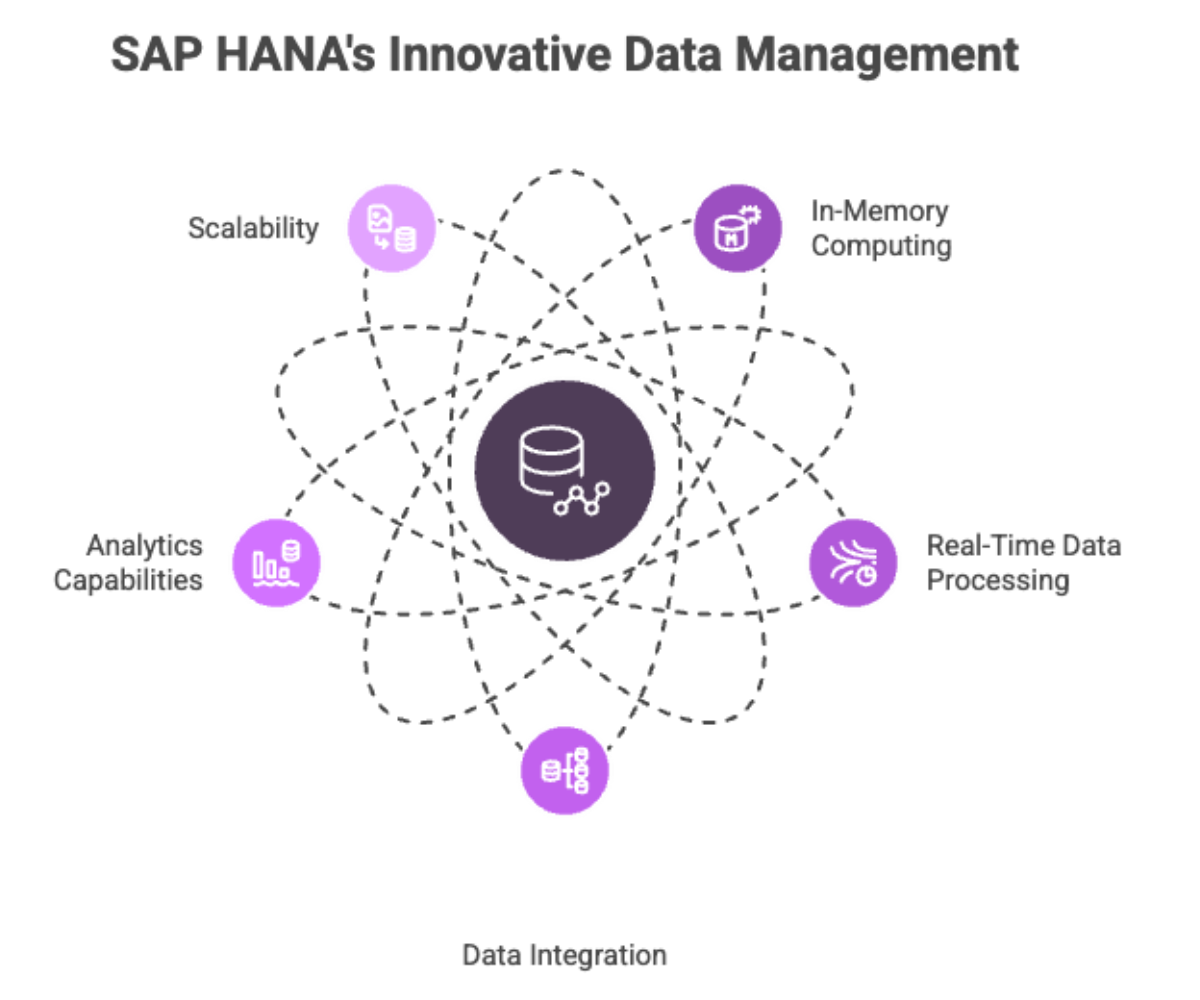

SAP S/4HANA: The Future of Enterprise Resource Planning
SAP S/4HANA represents the next generation of enterprise resource planning, leveraging advanced technologies like AI and machine learning to enhance business processes. The integration of AI for predictive analytics and smart automation allows businesses to anticipate trends and make proactive decisions. Additionally, the AI assistant Joule streamlines tasks and improves decision-making, empowering users with intelligent technologies insights.
Generative artificial intelligence within SAP S/4HANA is transforming how businesses interact with their ERP systems. This technology enhances user experiences by personalizing interactions and automating routine tasks, leading to increased efficiency and accuracy in data processing. The enhanced automation learns from user interactions, continuously improving over time and driving operational excellence.
SAP S/4HANA’s powerful analytics tools uncover hidden patterns in business data, offering innovative insights that can drive strategic planning and operational improvements. By optimizing logistics and rethinking network design, SAP S/4HANA helps businesses achieve greater efficiency and prepare for future growth.
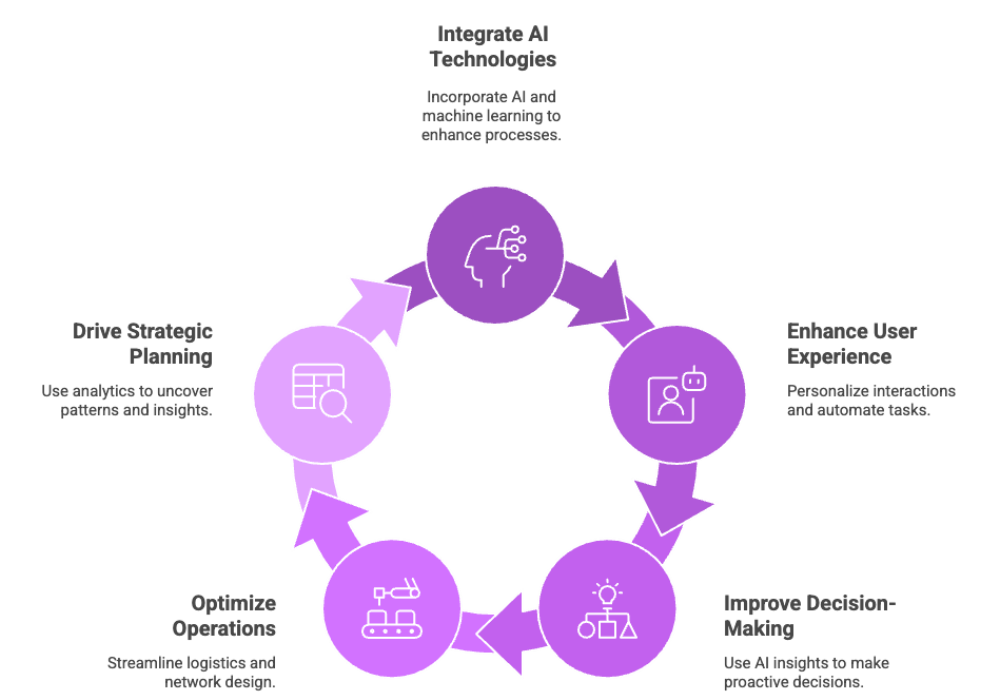

Customer Relationship Management with SAP
In the realm of customer relationship management, SAP’s comprehensive suite of Customer Experience Suite stands out by integrating marketing, sales team, service, and commerce into a cohesive platform. This holistic approach provides businesses with a comprehensive view of customer interactions, enabling them to tailor their strategies based on customer history and preferences.
Automation plays a crucial role in SAP’s CRM solutions, freeing up teams to focus on building relationships rather than handling administrative tasks. Enhancing collaboration across departments and integrating with various platforms, SAP’s CRM tools ensure a seamless customer experience across all engagement channels.
These capabilities help businesses improve their customer relationships and drive exceptional customer experiences.
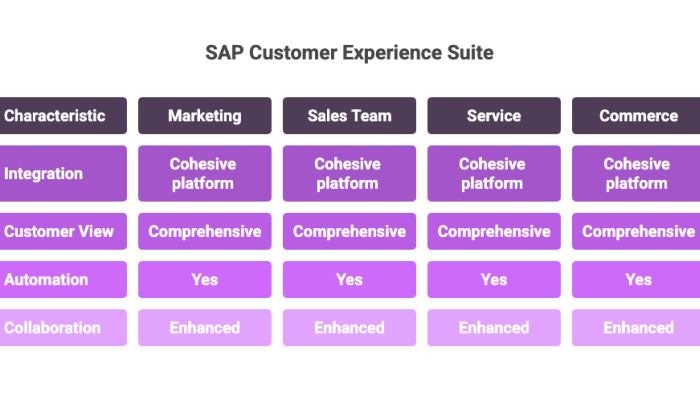

Financial Management Solutions
SAP’s financial management software solutions are designed to provide real-time payment capabilities and advanced reporting, streamlining core financial accounting processes such as invoicing, billing, and cashflow analysis. Integrating these functions, SAP enhances collaboration among finance teams and supports data-driven decision-making.
Real-time visibility into cash positions allows businesses to manage their treasury and working capital more effectively, leading to better financial planning and risk management. Additionally, SAP’s financial management tools support various compliance needs, including financial compliance, financial data, and data privacy, ensuring that businesses can navigate regulatory challenges with ease.
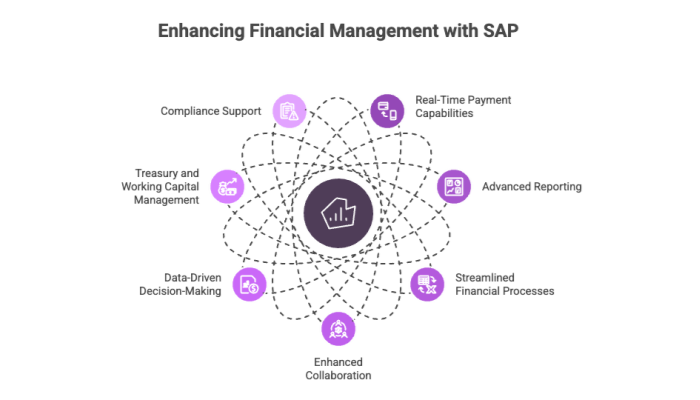

Human Capital Management with SAP Success Factors
SAP SuccessFactors is a comprehensive solution for human capital management, offering functionalities such as payroll, talent management, and human resources management. The SuccessFactors Suite XM integrates these functions, providing a unified source of data on people and skills, which helps businesses make informed decisions about their workforce.
Automation is a key feature of SAP SuccessFactors, streamlining HR processes such as recruiting and performance assessment through AI-driven tools and robotic process automation. The integration with finance and payroll solutions reduces manual errors, ensuring accurate and efficient HR operations. This automation not only enhances business efficiency but also improves employee engagement by allowing HR teams to focus on strategic initiatives to automate processes.
SAP SuccessFactors also supports personalized learning pathways and performance management analytics, aligning employee goals with organizational needs. These tools provide valuable insights into employee motivation and efficiency, enabling businesses to develop and retain top talent. Leveraging SAP SuccessFactors, companies can optimize their HR processes and drive growth through effective human capital management.
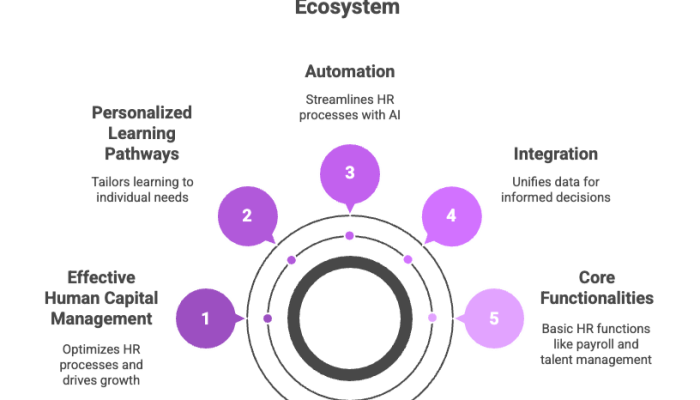

Supply Chain Management and Materials Management
Efficient supply chain management is critical to avoiding disruptions and maintaining smooth operations. SAP’s Supply Chain Management (SCM) module assists companies in planning logistics, managing manufacturing processes, and predicting equipment lifecycles. These tools help businesses refine their inventory management and supply chain operations, ensuring timely delivery of goods and services.
Integration with IoT and Industry 4.0 technologies further enhances SAP’s supply chain solutions, providing real-time tracking of goods and materials. This integration allows businesses to identify potential disruptions and forecast demand more accurately, improving overall operational efficiency and reducing the risk of supply chain interruptions.
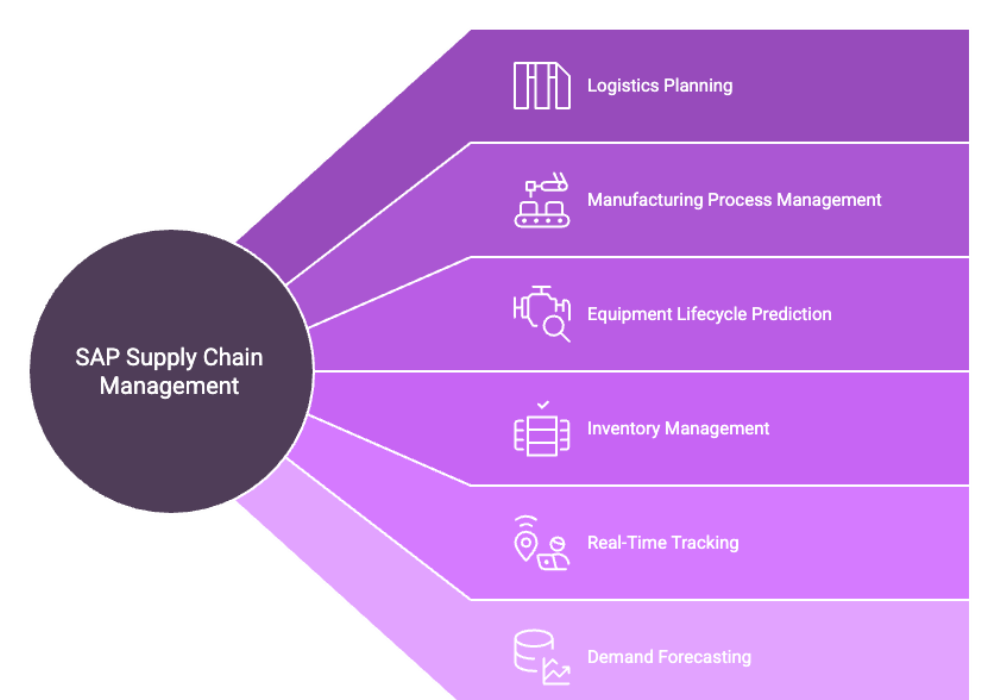

Digital Transformation with SAP Business Technology Platform
SAP’s Business Technology Platform (BTP) is a cornerstone of digital transformation, integrating data management, analytics, application development, automation, and AI into a cohesive framework. This platform supports a clean core architecture, enabling organizations to extend their systems without affecting core operations.
SAP BTP offers a range of services, including:
-
Workflow automation
-
System integration
-
AI-powered solutions These services allow businesses to tailor their digital transformation strategies to their specific needs. The subscription model of SAP BTP ensures scalability, enabling businesses to adjust their services as they grow and evolve.
By leveraging SAP BTP, organizations can accelerate digital transformation and achieve sustainable growth.
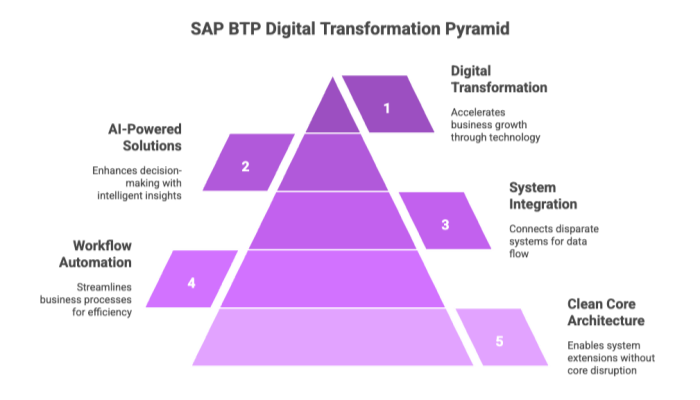

Industry-Specific Solutions
SAP understands that different industries have unique needs, which is why it offers tailored solutions for sectors such as automotive, retail, and the public sector. These industry-specific solutions help businesses align their capabilities with their unique requirements, driving collaboration and operational efficiency. SAP’s solutions, including those from sap se, are designed to enhance these processes effectively.
For example, SAP’s solutions for the automotive industry support the manufacturing of electric vehicles and the integration of AI with connected cars. In the retail sector, SAP enables businesses to enhance customer engagement and manage inventory more effectively.
The public sector benefits from improved service delivery and operational transparency through SAP’s tailored solutions. Providing industry-specific solutions, SAP helps businesses stay competitive and adapt to industry trends.
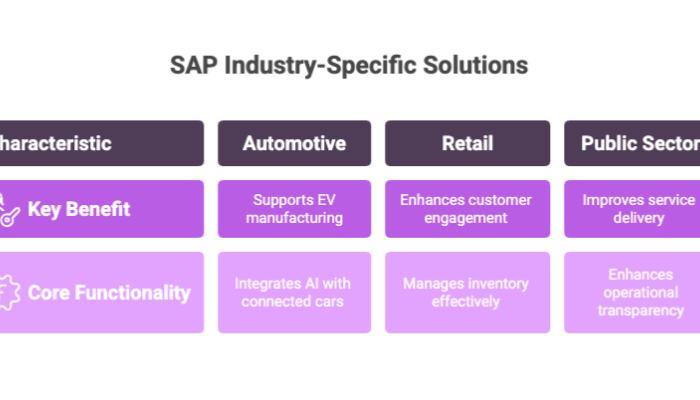

Cloud Deployment Options
SAP Cloud Platform offers three primary cloud deployment models:
-
Infrastructure as a Service (IaaS): Allows businesses to manage their infrastructure while focusing on application development.
-
Platform as a Service (PaaS): Provides a platform for developers to create, test, and manage applications without the need to handle underlying infrastructure.
-
Software as a Service (SaaS): Delivers sap software applications over the internet, eliminating the need for local installations. Additionally, sap offers various tools to enhance application performance.
Adopting cloud deployment can lead to increased agility and faster time-to-market for businesses. The benefits of SAP Cloud ERP include reduced costs and improved service delivery, as well as the ability to integrate and manage data from diverse sources for more informed decision-making.
Leveraging cloud deployment options, businesses can enhance their operational efficiency and stay agile in a dynamic market.
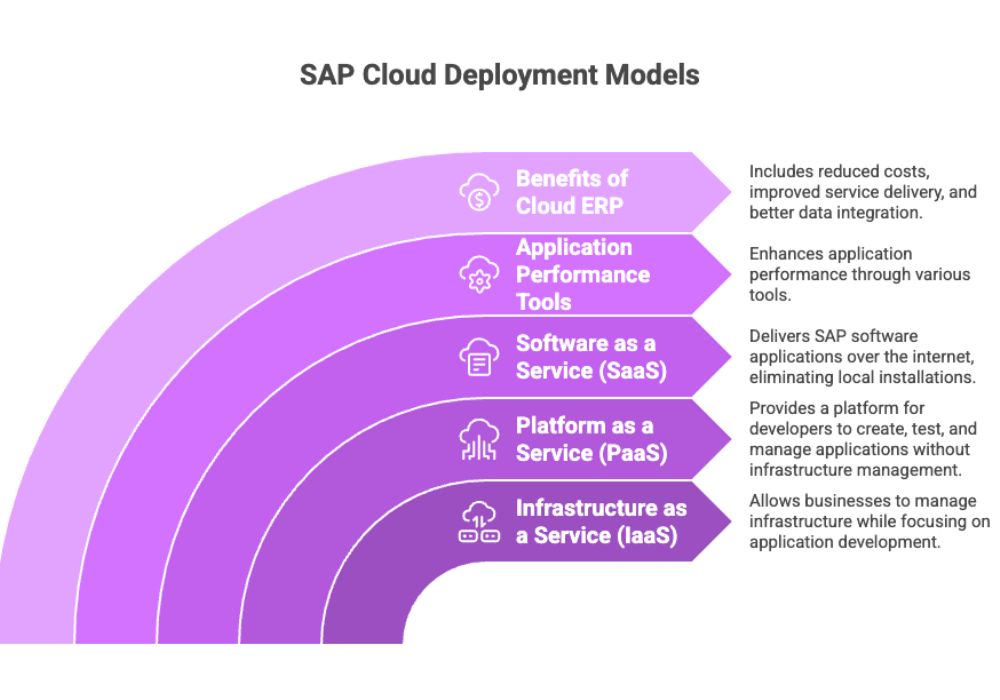

Enhancing Procurement Processes
SAP enhances the procurement process by streamlining procurement processes through a centralized hub, leading to more efficient collaboration between suppliers and buyers. The sap modules consolidate requisitioning, sourcing, purchasing, and payment, creating a unified platform that enhances efficiency and reduces administrative costs.
Real-time visibility into orders, deliveries, and payments allows businesses to monitor and manage their procurement activities more effectively. Features like supplier self-service portals improve communication and reduce order inaccuracies, while automated processes help identify potential savings and optimize procurement strategies, providing real time access to critical information.
Leveraging SAP’s procurement solutions, businesses can enhance efficiency, achieve greater operational efficiency, and avoid supply chain disruptions while realizing cost savings.
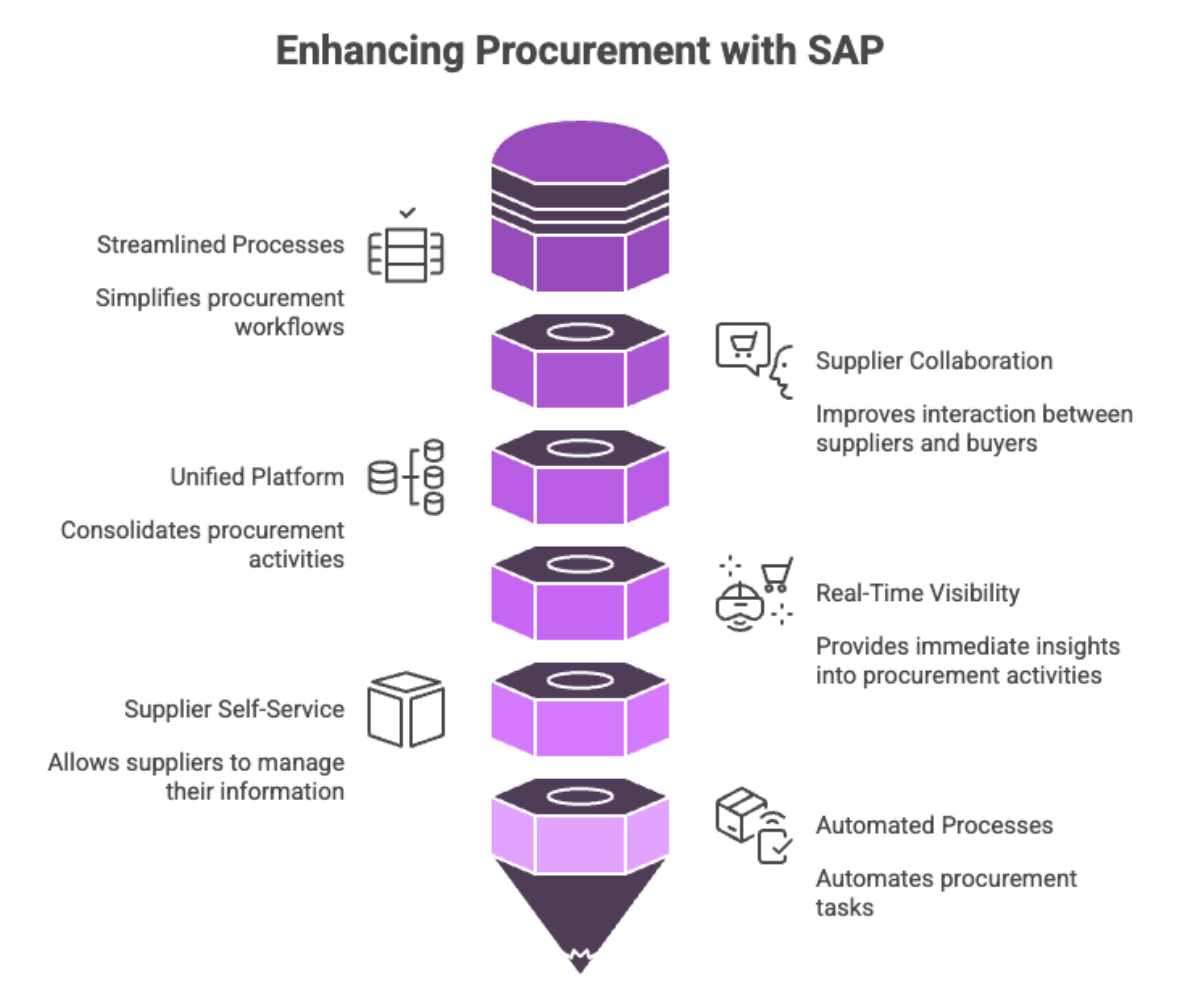

Real-Time Insights and Analytics
SAP’s real-time insights and analytics capabilities are powered by SAP HANA, which enables businesses to quickly adapt to market dynamics and make informed decisions. The platform processes large volumes of data rapidly, supporting both analytical and transactional workloads. With advanced tools and embedded machine learning, SAP helps organizations derive meaningful insights from their data, enhancing strategic planning and operational efficiency.
Analyzing entire business operations over time, SAP provides real-time data and service data that supports sustainable growth initiatives and better resource allocation. The cloud offerings facilitate real-time data processing access, further enhancing decision-making processes and allowing businesses to stay agile in a competitive market.
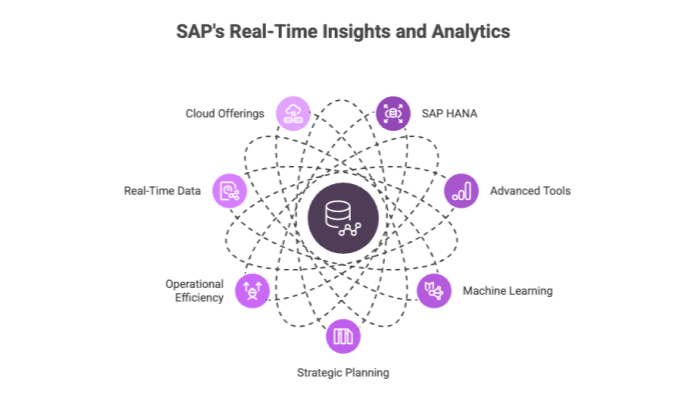

Improving Customer Experiences
In today’s competitive landscape, delivering exceptional customer experiences is paramount. SAP’s integrated solutions enable businesses to streamline customer interactions across various touchpoints, providing a seamless and consistent experience. Leveraging SAP’s customer experience tools, companies can gain real-time insights into customer needs and preferences, enabling personalized engagement that drives satisfaction and loyalty.
The SAP Customer Data Platform consolidates customer data, enabling precise targeting and improved marketing strategies. With AI-driven capabilities, SAP solutions anticipate customer expectations and enhance overall satisfaction. These tools help businesses not only meet but exceed customer expectations, fostering long-lasting relationships and driving business growth.
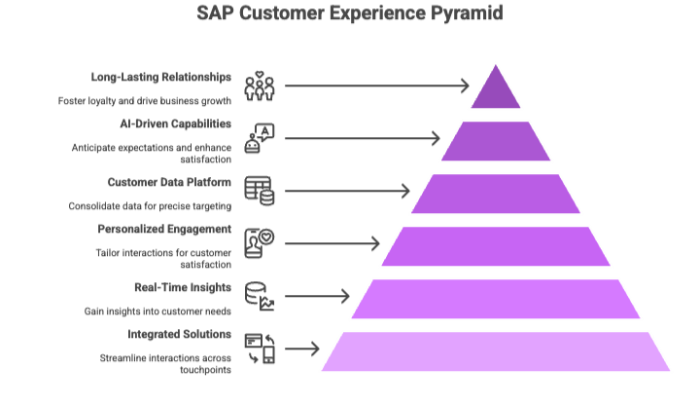

Compliance and Risk Management
Compliance and risk management are critical aspects of business operations, and SAP’s solutions are designed to streamline these processes. Governance, risk, and compliance features in SAP financial solutions help businesses meet regulatory requirements efficiently. By utilizing trusted data across financial and non-financial information, SAP solutions can streamline compliance procedures and reduce compliance risks.
Key features of SAP’s compliance solutions include centralized documentation of controls and risks, which facilitates proactive management and response to issues. SAP SuccessFactors also enables organizations to adapt seamlessly to changes in legal and regulatory requirements through automatic updates.
Furthermore, SAP’s industry solutions promote sustainable practices by facilitating carbon footprint tracking throughout operations. Integrating risk management with operational processes, SAP helps businesses maintain compliance and achieve sustainable growth.
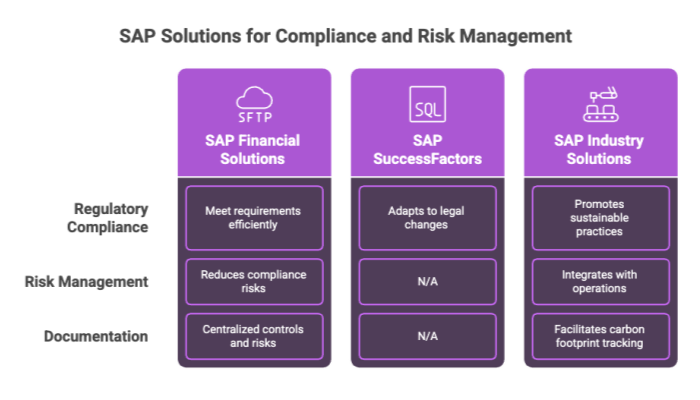

Summary
In conclusion, SAP’s comprehensive suite of solutions is transforming business operations by enhancing efficiency, providing real-time insights, and improving customer experiences. From the foundational SAP ERP to the advanced capabilities of SAP HANA and SAP S/4HANA, these tools are designed to meet the diverse needs of modern enterprises. By leveraging SAP’s innovative technologies and industry-specific solutions, businesses can achieve sustainable growth, navigate regulatory challenges, and stay ahead of the competition. Embrace the power of SAP and unlock the full potential of your business operations.

Frequently Asked Questions
To help you better understand how SAP solutions can transform your business operations, here are answers to some common questions. These FAQs cover key aspects of SAP systems, including how SAP launched its innovative products, the role of user interfaces in enhancing efficiency, and why SAP is recognized as a global leader in improving business processes. Whether you are exploring SAP applications for financial management, human resources, or supply chain management, these insights highlight the value of investing heavily in digital transformation with SAP.
What is SAP ERP and how does it benefit businesses?
SAP ERP is a comprehensive platform that integrates and manages essential business processes like finance, HR, and supply chain. By enhancing collaboration and streamlining operations, it enables businesses to make informed decisions based on a unified view of their data.
How does SAP HANA improve data management?
SAP HANA significantly enhances data management by leveraging in-memory computing, which enables rapid access and real-time processing of data. This capability, combined with its ability to integrate data from multiple sources, allows for advanced analytics and comprehensive insights.
What are the key features of SAP S/4HANA?
SAP S/4HANA features advanced AI and machine learning capabilities for predictive analytics and smart automation, along with powerful analytics tools to optimize business processes. These enhancements lead to improved user experiences and efficiency in operations.
How does SAP enhance customer relationship management?
SAP enhances customer relationship management by integrating various functions like marketing, sales, and service to streamline customer interactions. This approach automates tasks and provides real-time insights, promoting personalized engagement and improved collaboration.
What are the benefits of SAP's financial management solutions?
SAP's financial management solutions enhance collaboration and compliance while offering real-time visibility into cash positions, enabling effective financial planning. Additionally, their advanced reporting and integrated capabilities improve payment processes and cash flow analysis.

